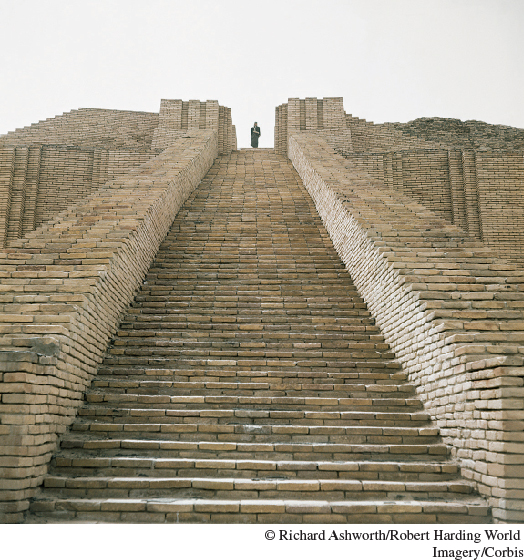Coercion and Consent
Yet early states in Mesopotamia, Egypt, China, Mesoamerica, and elsewhere were influential, drawing their power from various sources, all of which assisted in providing cohesion for the First Civilizations. One basis of authority lay in the recognition that the complexity of life in cities or densely populated territories required some authority to coordinate and regulate the community. Someone had to organize the irrigation systems of river valley civilizations. Someone had to direct efforts to defend the city or territory against aggressive outsiders. Someone had to adjudicate conflicts among the many different peoples, unrelated to one another, who rubbed elbows in the streets of early cities. The state, in short, solved certain widely shared problems and therefore had a measure of voluntary support among the population. For many people, it was surely useful.
Guided Reading Question
▪CHANGE
What were the sources of state authority in the First Civilizations?
The state, however, was more useful for some people than for others, for it also served to protect the privileges of the upper classes, to require farmers to give up a portion of their product to support city-dwellers, and to demand work on large public projects such as pyramids and fortifications. If necessary, state authorities had the ability, and the willingness, to use force to compel obedience. An Egyptian document described what happens to a peasant unable to pay his tax in grain:
Now the scribe lands on the shore. He surveys the harvest. Attendants are behind him with staffs, Nubians with clubs. One says [to the peasant], “Give grain.” There is none. He is beaten savagely. He is bound, thrown into a well, submerged head down. His wife is bound in his presence. His children are in fetters. His neighbors abandon them and flee.12
AP® EXAM TIP
Expect to see AP® exam questions on how kings of early states – and kings throughout history – used religion to back up their claims to power.
Such was the power of the state, as rulers accumulated the resources to pay for officials, soldiers, police, and attendants. This capacity for violence and coercion marked off the states of the First Civilizations from earlier chiefdoms, whose leaders had only persuasion, prestige, and gifts to back up their authority. But as states increasingly monopolized the legitimate right to use violence, rates of death from interpersonal violence declined as compared to earlier nonstate communities.13

Force, however, was not always necessary, for the First Civilizations soon generated ideas suggesting that state authority as well as class and gender inequalities were normal, natural, and ordained by the gods. Rulers in many places were thought to be morally responsible for the care of their subjects, especially in times of crisis or catastrophe. Kingship everywhere was associated with the sacred. Ancient Chinese kings were known as the Son of Heaven, and only they or their authorized priests could perform the rituals and sacrifices necessary to keep the cosmos in balance, thus preventing war, pestilence, and natural disaster. Mesopotamian rulers were thought to be the stewards of their city’s patron gods. Their symbols of kingship — crown, throne, scepter, mace — were said to be of divine origin, sent to earth when the gods established monarchy. Egyptians, most of all, invested their pharaohs with divine qualities. Rulers claimed to embody all the major gods of Egypt, and their supernatural power ensured the regular flooding of the Nile and the defeat of the country’s enemies.
But if religion served most often to justify unequal power and privilege, it might also on occasion be used to restrain, or even undermine, the established order. Hammurabi claimed that his law code was inspired by Marduk, the chief god of Babylon, and was intended to “bring about the rule of righteousness in the land, to destroy the wicked and the evil-doers; so that the strong should not harm the weak.”14 Another Mesopotamian monarch, Urukagina from the city of Lagash, claimed authority from the city’s patron god for reforms aimed at ending the corruption and tyranny of a previous ruler. In China during the Western Zhou dynasty (1046–771 B.C.E.), emperors ruled by the Mandate of Heaven, but their bad behavior could result in the removal of that mandate and their overthrow.